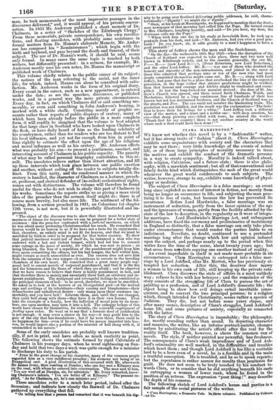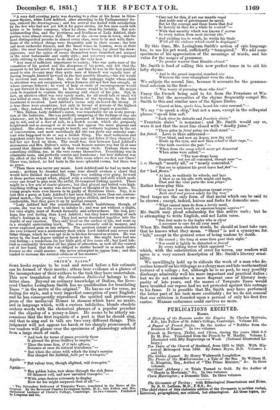CLARA. HARRINGTON..
WE know not whether this novel is by a " fashionable" writer, but it has strong traits of " fashion" about it. Clara Harrington exhibits some acquaintance with society and the characters that may be met there ; very little knowledge of the events of actual life, or of those large principles of morality necessary to trace the motives and exhibit the conduct of the dramatis personae in a way to create sympathy. Morality is indeed talked about, with religion, Calvinism, and a future state ; there is also philo- sophy, with a mawkish sentiment; but all of that conventional and falsely feeble kind which distinguishes the mob of the great world whenever the great world condescends to such subjects. The writer, however, strange to say, exhibits some knowledge of physi- ology or medicine. The subject of Clara Ffarrington is a false marriage ; an event long since exploded as means of interest in fiction, not merely from being no longer an occurrence in life, and subjecting the man prac- tising it to loss of caste, but because the law has prevented its occurrence. Before Lord Ilardwicke, a false marriage was an instrument of seduction, partly from the laxer opinion of the age and the ignorance of women, partly from the facility afforded by the state of the law to deception, in the regularity as it were of irregu- lar marriages. Lord Hardwicke's Marriage Act, and subsequent additions, have fixed the ceremony and preliminaries of matrimony in England so distinctly, that a false marriage can only take place under circumstances that would render the parties liable to an indictment. Novelists, no doubt, continued to use a pretended marriage long after the change which law and opinion induced upon the subject, and perhaps nearly up to the period when this writer fixes the time of the scene, about twenty years ago ; but that arose from novelists copying one another instead of reality. An event improbable in itself is not made more probable in its circumstances. Clary Harrington is entrapped into a false mar- riage by a Lord Ashford, alias Mr. Merton, who has previously at- tempted her seduction. After this, 'the deceiver does marry a woman in his own rank of life, still keeping 'up the private 'esta- blishment. Clara discovers the state of affairs in a most unlikely way ; refuses to live with her betrayer ; and the remainder of the story consists of the struslling life of Clara to pursue the art of painting as a profession, and of Lord _Ashford's domestic life ; the object being to show how evil doings entail inevitable conse- quences, and to convert the two principal persons;' to a religion which, though intended for Christianity, seems rather a species of Judaism. They die, but not before some years elapse, and after many scenes, descriptive of Clara's struggles, Lord Ashford's home life, and some pictures of society, especially as connected with the latter.
The story of Clara Harrington is improbable ; the philosophy, &e. mostly sounding rather than sound. In depicting character and manners, the writer, like an inferior portrait-painter,' changes nature by substituting the artist's efforts after the real for the reality itself. The book, however, is above the common run of novels. The style, if neither pOint!ed nor powerful, has freshness. The consequences of Clara's weak imprudence and of Lord Ash- ford's criminality are well marked, in the difficulties and troubles which beset them ; and though Lord Ashford is too like a veritable lord to be a hero even of a novel, he is a forcible and in the main a truthful conception. He is troubled, and he so to speak repents; but the repentance is rather sorrow for, results than penitence for guilt. He does not seem to be truly touched by his conduct to- wards Clara, or to consider that he did anything beneath his caste in entrapping a woman of lower rank, whom he found in the position of an actress. The expression "poor thing !" may describe the depth of his remorse. The following sketch of Lord Ashford's house and parties is a fair sample of the social pictures of the writer. • C'ara Harrington; a Domestic Tale. homes volumes. Published by Colburn :nd Co. "A very dull evening party was drawing to a close at his house in Gros- venor Square, whein Lord Ashford, after attending to his Parliamentary du- ties, entered the drawingroom ; and his arrival was bailed with satisfaction by the few who had not yet left it for gayer circles, for few men could talk better or be better company, when he chose, than his lordship. But not- withstanding this, and the prettiness and liveliness of Lady Ashford, their parties were almost always dull. Most of the clever men in town, and the most distinguished persons in almost every class, were to be met with there Some of the wittiest things were frequently said in their rooms ; the best and most recherché dinners; and the finest wines in London, were at their table ; the most beautiful engravings, the newest books, lay about the draw- ingrooms, and the suites of rooms themselves were furnished and arrayed in the most fashionable and costly style ; and yet every one felt oppressed while striving to the utmost to do and say the very best. " Any man of sufficient importance in society who was quite sure of the roundness of his period and the sharpness of his point, and felt that the moment to let his arrow fly had arrived, and that he was in the best possible mood to aim it—any man thus quite sure of himself was equally sure of having brought himself forward on the best possible theatre,—his wit would be received and recorded. But, alas for the unhappy wight whose claim to attention was not recognized, whose humour did not flow fast enough, or whose courage faltered ; no word of help or smile of encouragement would be put forward to his succour. In his misery would he be left. He might even be required to explain the meaning and object of his joke. But, in fact, an abortive effort was very rarely made, for all small talk or small wit was killed at once, like the weakly children of the Spartans, by the hard treatment it received. Lord Ashford's rooms only sheltered the strong. It is true there were exceptions, but only in favour of persons of the highest rank : they, indeed, were privileged to be as dull and stupid as possible. Mrs. Dalton, Lady Ashford's sister, was remarkable for an acute percep- tion of the ludicrous. She was perfectly unsparing of the feelings of any one whatever ; not to be daunted herself; possessed of humour almost amount- ing to wit, and of a flow of talk, iu a Scotch accent, which she purposely heightened and so managed as to make her appear the more picivant and original. She alone was enough to terrify any ordinary beginner in the art of conversation, and most mercilessly did she run down any unlucky aspi- rant who happened to do or say a foolish thing. The most audacious and impudent roues have been known to turn pale and falter if they chanced to feel her eye fixed on them. The result was, that between Lord Ashford's moroseness and Mrs. Dalton's satire, weak human nature was but ill at ease around that dinner-table and in that evening oirole. Perhaps there was something chilling, too, in the very rooms themselves. Everything was in admirable taste, andperfectly correct and handsome ; but how different was the effect of the whole to that of the little room where we first saw Clara! There was, indeed, no bad taste in the more splendid rooms, but there was no grace.
"Then there was never any music. Lord Ashford said he had no taste for music : perhaps he dreaded lest some tone should awaken a chord that would have thrilled too painfully. There was nothing ever going forward at these parties except whist, played with a solemnity and skill which made every one dread to pass near the awful; ill-tempered looking quartet. There might be a few sets of ecarte-players; but they played and betted very high. Anything trifling or merry was never heard or thought of in that house. No young people were ever known to be guilty of flirtations there. Nay, it is said that a party at Lady Ashford's had been fatal to more than one contem- plated meta —, the young lovers having got so chilled, and been made so un- comfortable, that they gave it up by mutual, consent. "Lady Ashford had the constitutional Scotch bashfulness, though, of course, she was too well-bred to indulge it ; and was not without a slight, but very slight, taint of Scotch formality and awkwardness. She had, per- haps, less real feeling than Lord Ashford ; but they knew nothing. of each other's feelinga in any way, They had never descended together into the depths of any emotion. They only lived on the surface of life, and went on in a straight undeviating track. She was extremely cold in manner, and never expressed pain on any subject. The greatest extent of manifestation she ever evinced was &momentary flush when Lord Ashford said severe and bitter things, which he was at to do to his less favoured associates. He was never in the least degree unkind or harsh to her. She might have had one real feeling—a tenderness for her little girl, of five years old ;-but Lord Ash- ford so constantly thwarted all her plans of education, so took all the control out of her band, that she was obliged to shelter herself' in as much indif- ference as she could muster. She never attempted to oppose him ; and this tended to increase the natural coldness of her manner."



























 Previous page
Previous page